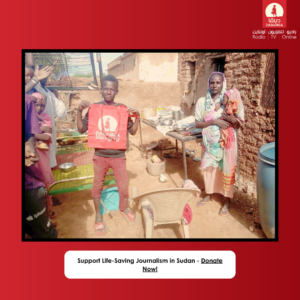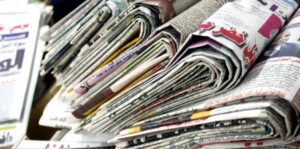Newspapers seized in Sudan, press corps boycott parliament
On Monday, agents of Sudan’s National Intelligence and Security Service (NISS) confiscated the print-run of Akhir Lahza newspaper without giving any reasons. This is the second confiscation of this type this week. The print-run of El Sayha newspaper was seized on Sunday.
On Monday, agents of Sudan’s National Intelligence and Security Service (NISS) confiscated the print-run of Akhir Lahza newspaper without giving any reasons. This is the second confiscation of this type this week. The print-run of El Sayha newspaper was seized on Sunday.
Feisal El Bagir, Coordinator-general of Journalists for Human Rights (JHR), condemned the confiscation of the newspapers as a continuation of violations of the press freedom by the NISS. He called on the newspapers to “prosecute the NISS to reveal its repeated violations”.
He pointed out that the newspapers suffered heavy financial losses as a result of the confiscations after printing, weakening the press and forcing them into self-censorship in order to escape confiscation.
Solidarity
The delegates of the political newspapers in the Sudanese parliament boycotted the activities of the parliament in Omdurman in solidarity with their colleague Murtada Ahmed, a representative of El Ahram El Yowm newspaper who was denied access by the security authorities to parliament without giving reasons on Tuesday.
A statement issued by newspaper delegates called on the leadership of the parliament to appeal to the judiciary, which everyone believes “instead of taking an authoritarian step”.
‘Bullying’
On Monday, the General Secretariat of the National Assembly began suing El Jareeda and El Ahram El Yowm newspapers for publishing a story attributed to the Deputy Speaker of Parliament, Badriya Suleiman, that announced her rejection of the appointment of a third Deputy Speaker and proposed to resign from the post.
The statement condemned the step of the parliament as “bullying that is incommensurate with the Council as an institution tasked with the extension and protection of freedoms.”
The statement added that “denying journalist Murtada Ahmed access to the buildings of parliament is a settlement of personal conflict.”
Restrictions
In July, Maha El Tileb, reporting for El Tayyar, was detained by the NISS for several hours following the publication of an interview with a state minister and director of the President's Office.
The print-runs of newspapers El Jareeda and El Wifag were confiscated in july as well. According to the editor-in-chief of El Jareeda “The reason for the confiscation was a column published in the newspaper entitled ‘Exploitation of Influence’, by employees of the security apparatus.” On 10 July, all copies of El Zawya sports newspaper were taken from the printing press by security officers, because of a report on a debacle between the international football association FIFA and the Sudanese government.
Press curbs
During the past years, the NISS upgraded its already severe restrictions on press freedoms by restoring 'pre-publication censorship' and issuing a number of 'red lines' on matters that are not supposed to be covered by the media.
The purpose of confiscating print-runs is to exhaust the newspapers financially, the editor-in-chief of El Jareeda newspaper earlier explained to Radio Dabanga. “It is in fact a direct and methodical liquidation, meant to kill the independent press,” he said.
The Sudan scores 86 points out of 100 (0=Most Free/100=Least Free) on the list of 201 countries in the Freedom of the Press 2017 report of the USA-based Freedom House.











 and then
and then